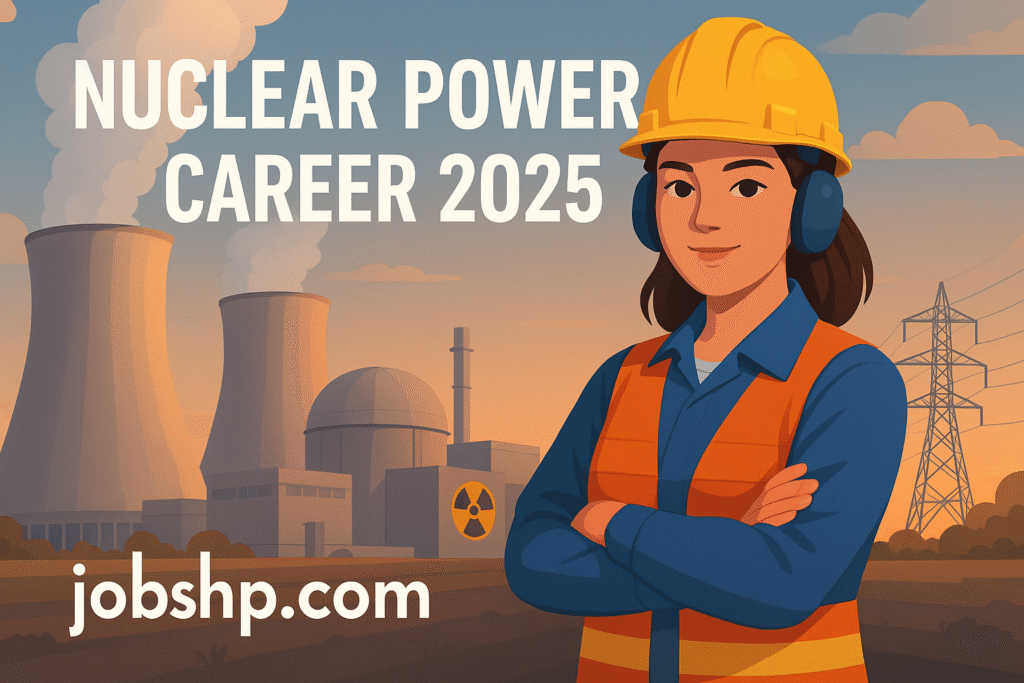
Discover the most in-demand nuclear power careers in 2025. Explore high-paying roles, required qualifications, and how to launch your future in clean energy.
Also Check: FoodPanda Rider Jobs 2025 | Join Now
Nuclear Power Career 2025
If you are thinking about building a stable and rewarding career, nuclear energy might just be the right path. As countries around the world push for greener and more dependable power sources, nuclear technology is making a solid return. With that comeback, 2025 is expected to bring a range of exciting career paths for individuals with the right skills and a passion for energy innovation.
Let is explore why this sector is booming, what careers are available and how you can get started.
Quick Snapshot Nuclear Power Career 2025
| Key Aspect | Details |
|---|---|
| Industry Growth | 8% projected job increase (2023-2028) |
| Average Salary Range | $70,000 – $150,000 per year |
| Key Roles | Engineers, Technicians, Safety Officers |
| Education Required | Associate to Masters Degree |
| Job Locations | USA, Canada, Europe, Asia |
| Work Environment | Power plants, Labs, Fieldwork |
What Makes Nuclear Power a Smart Career Choice?
Nuclear energy is not only clean and efficient but also reliable and expanding as countries invest more in low carbon technologies. A career in this field means:
- Job Security: With aging infrastructure and global demand, skilled workers are in short supply.
- Great Pay: Many nuclear positions pay well above the national average.
- Skill Development: Cutting-edge technology, science and engineering await.
Top Careers in Nuclear Power (2025)
1. Nuclear Engineers
- What They Do: Design, develop, and maintain nuclear reactors and systems.
- Education: Bachelors and Masters in Nuclear engineering.
- Salary: 56,000 / 140,000
2. Radiation Protection Technicians
- What They Do: Monitor radiation levels, ensure safety protocols.
- Education: Associate degree + certification.
- Salary: 50,000 / 120,000
3. Reactor Operators
- What They Do: Operate and control nuclear reactors.
- Education: Technical diploma + NRC license.
- Salary: 40,000 / 100,000
4. Health Physicists
- What They Do: Ensure the safety of workers and the public from harmful radiation.
- Education: Bachelors or Masters
- Salary: 45,000 / 120,000
5. Nuclear Safety Experts
- What They Do: Ensure regulatory compliance and plant safety.
- Education: Engineering degree + regulatory training.
- Salary: 40,000 / 130,000
Our First Steps Toward a Career in Nuclear Power
Here is how you can enter the nuclear workforce in 2025:
1. Get the Right Education:
- Start with a degree in nuclear engineering, physics, mechanical or electrical engineering.
- Consider specialized training or certifications (e.g., NRC licensing).
2. Apply for Internships or Entry-Level Jobs:
- Join a nuclear plant, government agency, or research facility.
- Gain hands on experience while still studying.
3. Network with Industry Experts:
- Attend industry events, webinars and training programs.
- Join nuclear societies or professional groups.
4. Stay Updated:
- Technology and safety regulations are always evolving.
- Continuing education and certifications are key.
Contact Us for Guidance
| Contact Info | Details |
| Website | https://paec.gov.pk/careers/ |
| info@nuclearcareerhub.com | |
| Phone | +1-800-555-NUKE (6853) |
| Office Hours | Mon-Fri, 9:00 AM – 5:00 PM (EST) |
Final Thoughts
Nuclear Power Career 2025 is not just a buzzword. It Is a real opportunity. Whether you are just starting your education or looking for a mid career change. The nuclear industry is hiring, evolving and ready for a new generation of workers.
Take the first step today – your future in clean energy is waiting!
Need help planning your career? Reach out to us for personalized advice and training resources.
FAQs: Nuclear Power Career 2025
Q1: Is a career in nuclear power safe?
Absolutely. While the word “nuclear” might sound intimidating. The industry is one of the most heavily regulated and safety focused in the world. Workers receive extensive training and safety protocols are strictly enforced every day.
Q2: Do I need a degree in nuclear engineering to work in the field?
Not necessarily. While engineers are a big part of the industry. There are many other roles available like technicians, reactor operators, health physicists and administrative positions that only require an associate degree or specialized training.
Q3: What kind of salary can I expect in a nuclear career?
Most roles in nuclear power pay well above the national average. Entry level technicians might start around $60,000–$70,000, while engineers and senior roles can make $100,000 or more per year.
Q4: Are nuclear jobs only available in big cities or certain countries?
Nope! Nuclear facilities and opportunities are spread across many regions including smaller towns. Countries investing in clean energy like the U.S., Canada, France, China, and India are all seeing growth in this sector.
Q5: Can I switch to nuclear power from another industry, like oil and gas?
Definitely. Many skills from industries like oil, gas, and even manufacturing are transferable.
Q6: How do I get started if I am still in school or college?
Great question! You can Choose a relevant major like engineering, physics, or energy systems Apply for internships or summer programs at power plants or government labs Join student chapters of organizations like the American Nuclear Society (ANS) to build connections
Q7: What does the future look like for nuclear careers 2025?
The future looking bright and sustainable. With governments pushing for low carbon energy sources and advanced technologies like small modular reactors SMRs on the rise. Nuclear power is making a strong comeback and so are the career opportunities.